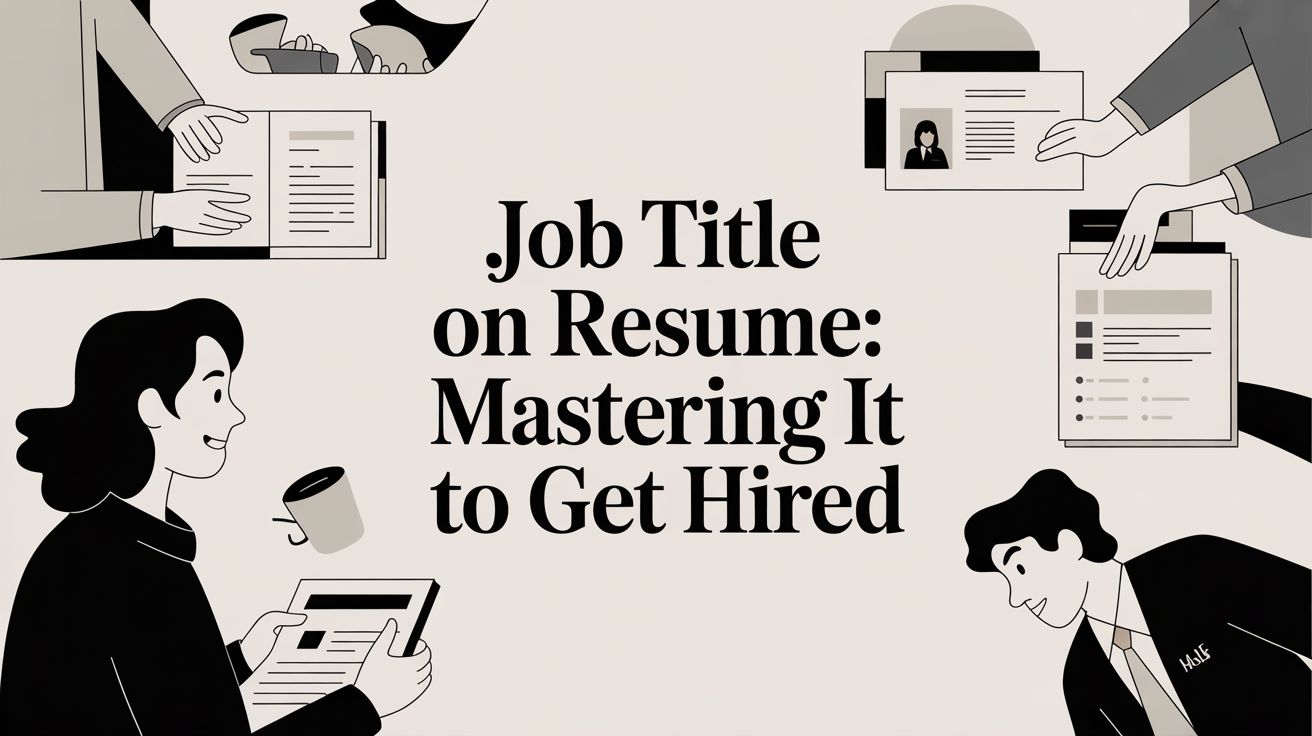Your job title is the very first thing an Applicant Tracking System (ATS) or a recruiter sees. It is the gatekeeper. If your title does not line up with the role you are targeting, your resume can get filtered out in seconds, no matter how perfect you are for the job. For data professionals, this is a critical detail that sets the tone for your entire application.
Why Your Resume Job Title Matters
Think of your job title as more than just a label. It is the most important keyword on your resume. We know recruiters spend an average of just six seconds on a resume, and the job title is where their eyes go first. A title that does not match their search creates instant friction, leading them to assume you are not the right fit.
This is a huge deal for data professionals, whose internal titles often do not reflect what they actually do. A company might call you a "Business Analyst II," but if you spend 90% of your day writing SQL and building Tableau dashboards, you are functionally a "Data Analyst." Sticking with the official title makes you invisible when recruiters are searching for the real one.
Choosing Your Best Title
Your goal here is simple: bridge the gap between your official title and what the market actually understands. You are not being dishonest; you are translating your experience for clarity and impact. The right move depends entirely on how well your internal title matches both your real responsibilities and the job you want next.
This chart breaks down the decision making process into a simple framework.
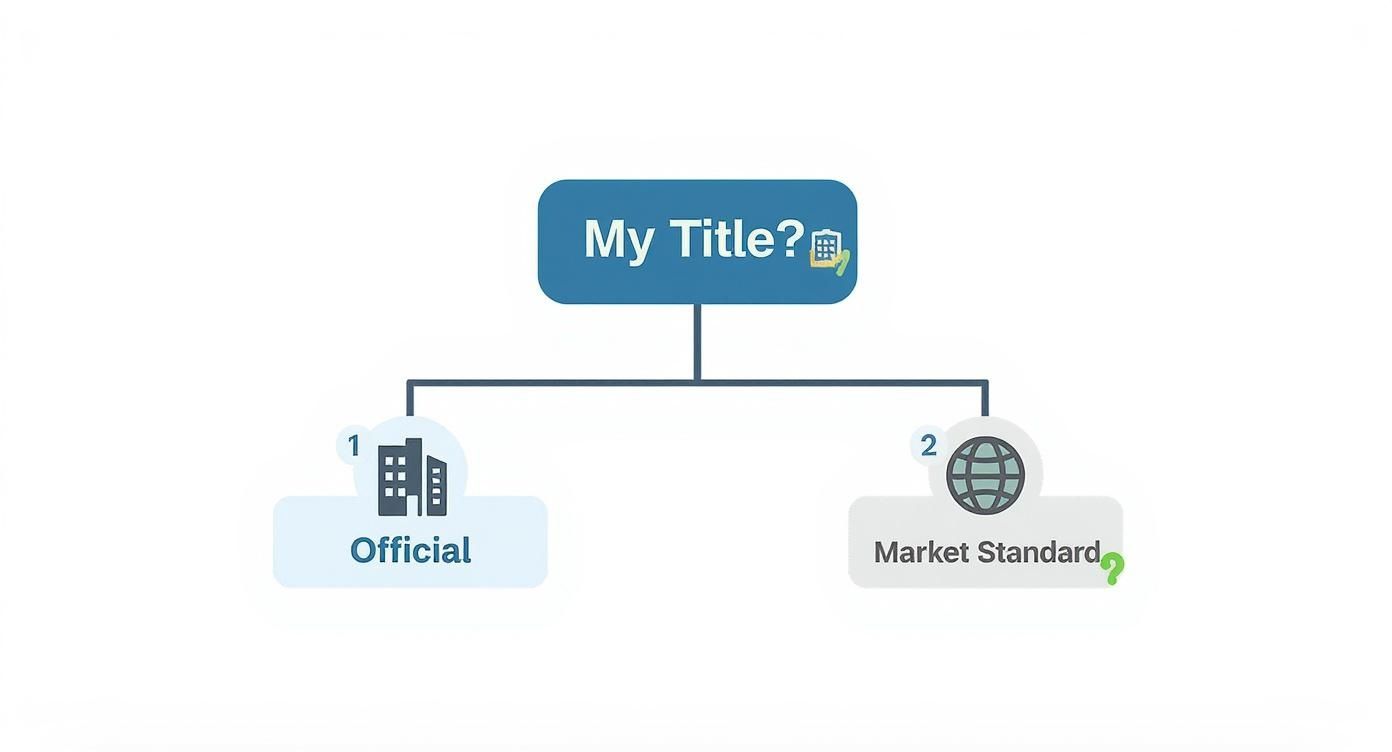
The main takeaway? Prioritize clarity. If your official title is clear and widely recognized, stick with it. But if it is vague, confusing, or specific to your old company, use a standard market title that accurately describes what you did.
To make this decision even clearer, here is a quick reference guide to help you decide when to stick with your official title and when to use a more descriptive, industry recognized one.
Official Title vs. Market Title Decision Framework
Ultimately, choosing the right title is about making the recruiter's job easier. A clear, relevant title helps them quickly see you as a potential fit, increasing the odds that they will actually read the rest of your resume.
Your job title is the most important keyword on your resume. It should immediately tell a hiring manager and an ATS that you have the relevant experience for the role they are trying to fill.
Getting this right from the start is non negotiable. It is a small detail that directly impacts whether your application moves forward or gets buried in a database. Understanding how to make this choice is the first step toward building a resume that gets past the bots and lands you more interviews.
Aligning Your Title with the Job Description for ATS
Before a human ever sees your resume, it has to get past the gatekeeper: the Applicant Tracking System (ATS). Think of this system as a bouncer with a very specific list. Your job title is your password, and if it does not match what is on the list, you are not getting in.
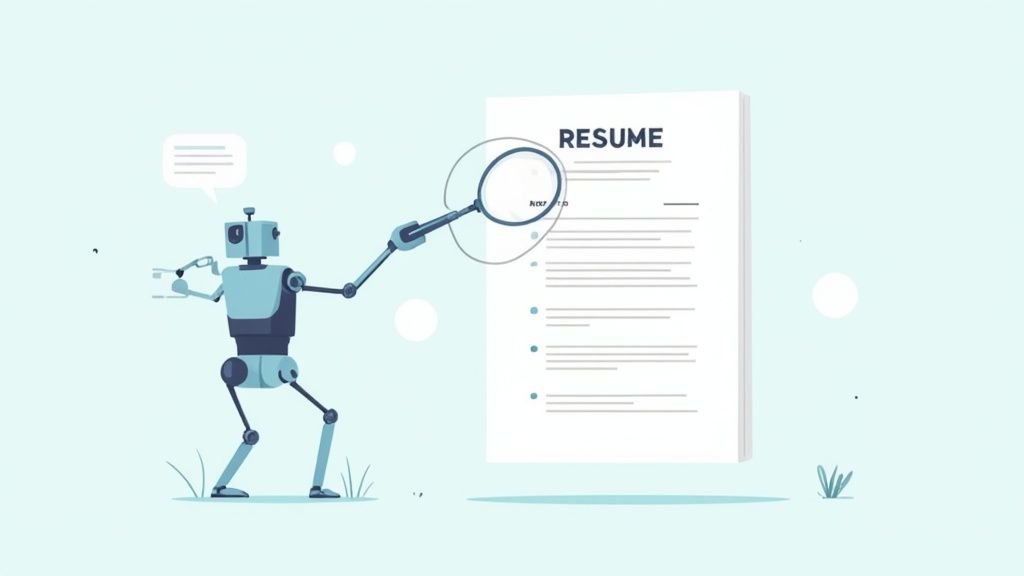
This is not just a friendly suggestion; it is a critical first step. An analysis by ResumeGo found that resumes tailored to a specific job description are 40% more likely to land an interview. The job title is the most important element of that tailoring process.
The strategy here is pretty straightforward. You need to dissect the job posting and find the exact title the employer is using. If they are looking for a "BI Developer," your resume needs to say "BI Developer," not "Business Intelligence Analyst," even if the work is nearly identical.
Translating Your Internal Title
Here is a common problem I see with data professionals: your internal, company given title does not really capture what you do. Maybe your official title is "Analytics Associate III," but you spend your days writing complex SQL and building out advanced Tableau dashboards. In the real world, that is the work of a "Senior Data Analyst."
In this situation, using a functional title on your resume is not just strategic; it is more accurate. You are not lying; you are translating your company’s internal jargon into the standard language of your industry.
Here is how to get it right:
- Dig into the Job Description: What are the core duties and must have skills? Are they talking about Python scripting, Power BI development, or data modeling?
- Do an Honest Comparison: Match your day to day work with what is listed in the posting. If your job was 90% building Power BI reports and they are hiring a "Power BI Developer," you have a solid case for using that title.
- Pick a Market Standard Title: Choose a title that is widely recognized in the data world and perfectly bridges your experience with the role you are targeting.
The whole point is to forge an immediate, obvious connection between your skills and their needs. A functional title that mirrors the job description creates that connection instantly, giving you a huge leg up in the ATS screening phase.
Automating the Matching Process
Let's be real: manually customizing your resume for every single application is a grind. Every remote job you apply for might use slightly different phrasing for the same role—think "Data Scientist" versus "Machine Learning Scientist." It is these tiny discrepancies that can get your application tossed out by the ATS.
This is where a tool like Jobsolv’s free ATS approved resume builder can be a game changer. It automates the tedious work of aligning your experience with the job description, ensuring your title and other key phrases are a perfect match. If you want to dive deeper into why this matters so much, check out our guide on why resume keywords for ATS matter more than ever. This helps your application sail past the initial robot screening and land in front of a real person, saving you time and dramatically boosting your chances of getting an interview.
Translating Vague or Hybrid Job Titles
Let’s be honest, sometimes your official job title feels like it was written in a different language. What are you supposed to do when your title is something generic like "Consultant," overly creative like "Data Jedi," or loaded with internal jargon like "Business Intelligence Specialist II"?
These titles mean next to nothing to an ATS or a recruiter. They can stop your application dead in its tracks.
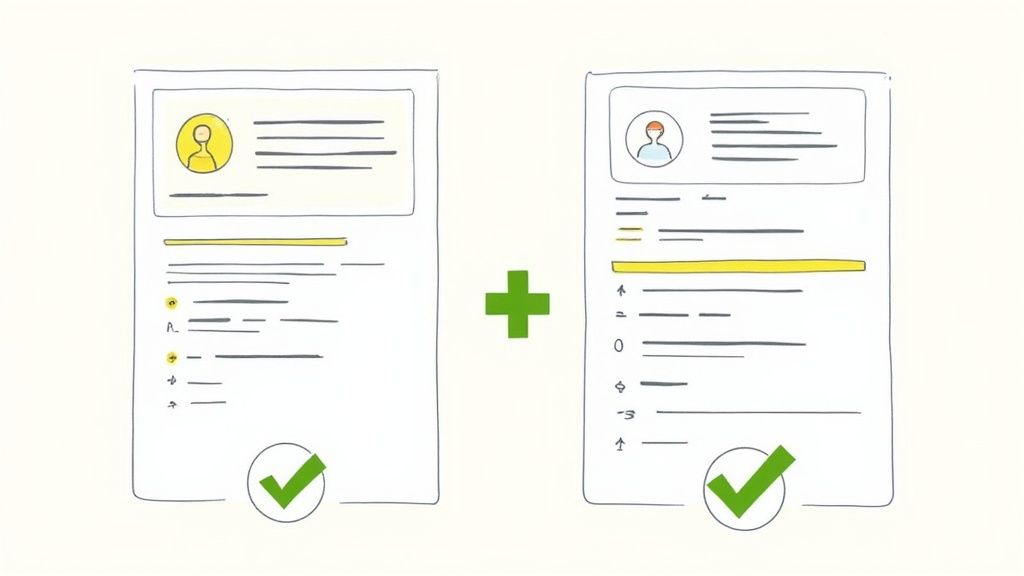
Your job is to translate that vague title into clear, industry standard language. This is not about misrepresenting your role; it is about accurately reflecting the work you actually performed. By focusing on your core duties, you can craft a resume title that speaks directly to hiring managers.
Decoding Your Daily Work
First things first: break down your responsibilities. Ignore your official title for a moment and get real about what you spent most of your time doing.
- Did you spend 80% of your day writing SQL queries and building dashboards in Tableau? Your functional title is closer to "Data Analyst" or "BI Analyst."
- Was your role heavily focused on Python scripting for predictive modeling? You were operating as a "Data Scientist," no matter what HR called you.
- If you primarily designed and maintained data pipelines, "Data Engineer" is a much clearer descriptor than "IT Systems Analyst."
This self audit is crucial for creating a title that is both honest and effective. For hybrid roles where you split time between different functions, you have a strategic choice to make. You can either pick the title that most closely aligns with the job you are applying for or use a combined title like "Data Analyst / BI Developer."
For more guidance on handling these multifaceted roles, check out our in depth look at a guide to the hybrid resume format.
Real World Translation Examples
Let's look at how this plays out in the real world. Vague or internal titles can almost always be improved for clarity and keyword optimization.
- Official Title: Business Intelligence Specialist II
- Core Duties: Spent 90% of the time developing complex reports and dashboards using Power BI.
- Better Resume Title: Senior Power BI Developer
See the difference? The translated title is specific, highlights a valuable technical skill (Power BI), and uses seniority to reflect the "II" in the original title. Research shows this specificity pays off, too. The average job title on a resume is now 3.2 words long, up from 2.7 in 2015, driven by the need for clarity in specialized roles. You can read more about the findings on ResumeBuilder.com.
Choosing a functional title is about providing context. You are helping the recruiter and the ATS connect the dots between your real world skills—like your expertise in SQL, Python, or Tableau—and the employer's needs.
The key is to make sure your new, clearer title is fully supported by the bullet points in your work experience section. This creates a consistent and compelling story that proves you have the skills for the job.
How to Format Job Titles on Your Resume
Once you have zeroed in on the right job title, the next step is making sure it looks right on the page. How you format your title in the Professional Experience section is critical. It is what guides the eyes of both recruiters and the ATS, helping them quickly grasp your career story. The goal here is simple: be clear, be consistent, and look professional.
Your formatting should be clean and straightforward. The job title needs to pop, but it should not scream. A simple, effective approach is to put your title on the first line of each job entry, right before the company name.
Best Practices for Title Placement
To make your title instantly noticeable, it needs to be the first thing a reader sees in each work experience block. I always recommend bolding the text and maybe bumping the font size up by 1 to 2 points compared to your bullet points. This creates a natural visual hierarchy, pulling the reader’s eye exactly where you want it to go.
A single, clean line is almost always your best bet.
For instance:
- Senior Data Analyst | ABC Corporation
- BI Developer – XYZ Solutions
This layout is a breeze for both people and software to read. It neatly separates your role from the company, preventing any mix ups.
Good Example:
Senior Data Analyst | Quantum Analytics
New York, NY | June 2021 – PresentBad Example:
Quantum Analytics, Senior Data Analyst, June 2021 to now in New YorkSee the difference? The second one is a jumbled mess that makes the reader work way too hard. Stick with the clean, scannable structure.
Showing Promotions and Title Changes
This is one of the most powerful stories you can tell on a resume. Showing you have grown within a company is a massive signal of your value and reliability. If you were promoted or your title changed, do not list each role as a separate job. That just clutters things up.
Instead, group them under a single company heading. List the company once, then stack your job titles underneath in reverse chronological order (your most recent role goes on top). This method paints a clear picture of your upward trajectory.
Here is exactly how to format a promotion:
Innovatech Solutions | Austin, TX | May 2019 – Present
Senior Data Scientist (January 2022 – Present)
- Led a team of four junior scientists in developing predictive models that increased customer retention by 15%.
- Implemented a new machine learning pipeline using Python and AWS SageMaker.
Data Scientist (May 2019 – January 2022)
- Developed SQL queries to extract and analyze data from a 50 TB data warehouse.
- Created interactive Tableau dashboards to track key business metrics for stakeholders.
This stacked format is incredibly effective. At a glance, a recruiter sees a story of increasing responsibility and trust, making you a much stronger candidate. It keeps your resume tight while shouting about your achievements and career momentum.
Job Title Formatting Examples for Data Professionals
Let's look at a few common scenarios data professionals run into and how to handle the formatting. Getting these details right can make a huge difference in how your experience is perceived.
These examples cover some of the most frequent formatting questions I get. The key takeaway is always clarity—make it as easy as possible for someone to understand your career path in a 6 second scan.
Common Job Title Mistakes to Avoid
Even the sharpest data pros can stumble over simple things, like how they list their job titles on a resume. These little slip ups can confuse an Applicant Tracking System or give a recruiter pause, killing your chances before you even get a real look. Think of this as your final quality check to make sure your resume is clean, professional, and ready to go.
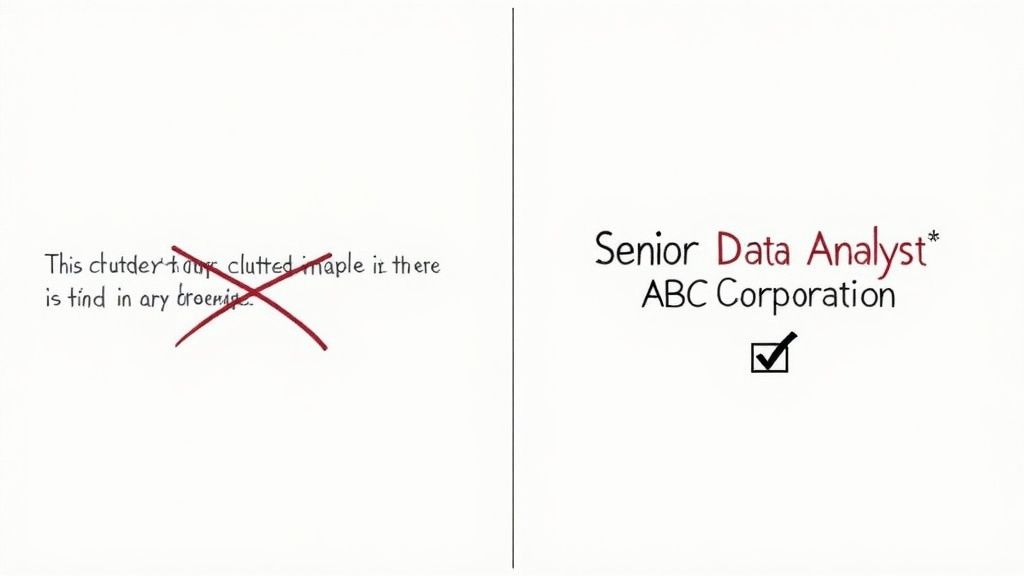
One of the biggest mistakes I see is people getting too creative. Sure, a title like "Data Wizard" or "Analytics Rockstar" sounds cool inside a startup, but it means absolutely nothing to an ATS. These systems are programmed to find standard keywords like "Data Analyst" or "BI Developer." A quirky title effectively makes you invisible to the initial search.
This trend is surprisingly common. A recent analysis found that 22% of resumes now include at least one non standard job title. But here is the catch: only 48% of those resumes get past the ATS screen, compared to 72% for resumes with traditional titles. You can dig into more resume stats and trends over at High5Test.com.
Misrepresenting Your Seniority
Another classic mistake is inflating your seniority. It is tempting to slap "Senior" onto your title to sound more experienced, but it can backfire badly. If your bullet points describe entry level work—like running pre written SQL scripts or just updating existing reports—that "Senior" title is going to raise a huge red flag.
Recruiters are trained to sniff out these kinds of inconsistencies. Your title needs to be an honest reflection of the complexity and scope of your actual responsibilities.
Your job title sets an expectation. Your experience bullet points must deliver on that promise. A mismatch between the two signals a lack of credibility and can get your resume tossed aside.
Inconsistency Across Platforms
Finally, make sure your titles are consistent everywhere—your resume, your LinkedIn profile, and any other professional site. If a recruiter sees "Senior Data Scientist" on your resume but your LinkedIn says "Data Analytics Associate," their alarm bells will start ringing immediately.
This kind of inconsistency creates doubt about your honesty and attention to detail. Before you start sending out applications for remote data jobs, spend a few minutes auditing your online presence. Make sure you are telling the same story everywhere.
Here are a few other common missteps to watch out for:
- Using Internal or Obscure Acronyms: A title like "BA III Corp Fin" means nothing to anyone outside your old company. Always translate internal jargon into plain, universally understood English.
- Forgetting to Update Old Titles: If you got promoted, your resume needs to show that. Using an old title undersells your current skills and responsibilities.
- Listing Multiple Titles Incorrectly: If you held a few different roles at the same company, use a stacked format under one company entry. Listing them as separate jobs makes your resume look cluttered and can be confusing.
Avoiding these simple mistakes is just as important as highlighting your Python skills. A clean, consistent, and honest presentation of your job title builds trust and helps you move smoothly through the hiring process.
Common Questions About Resume Job Titles
Finalizing your resume always seems to bring up a few last minute questions. To help you feel completely confident before you hit "submit," here are some quick, practical answers to the questions I hear most often from data professionals. Think of this as a final check to clear up any lingering confusion.
Should I Put My Job Title in My Resume Headline?
Yes, absolutely. Putting the target job title right in your headline or summary is one of the most powerful moves you can make. It is the first thing a recruiter sees.
A headline like "Senior Data Analyst with 5+ Years of Experience in SQL and Tableau" does not just grab attention—it immediately aligns you with the opening. It is the fastest way to signal to both the ATS and the human on the other side that you are a direct match for the role they are trying to fill.
Can I Use a Different Job Title Than My Official One?
You can, but only if the new title accurately reflects what you actually did and aligns with standard industry terms. This is about translation, not deception.
Let's say your official title was "Business Systems Analyst," but you spent 80% of your time creating Power BI dashboards and writing DAX. In that case, using a title like "Power BI Developer" is not only more accurate but far more effective for your job search.
The key is making sure your bullet points back it up. Your accomplishments must validate the title you are claiming. If the experience does not support the title, do not use it.
How Should I List a Promotion on My Resume?
When you have earned a promotion, you want to showcase that growth clearly. The best way to do this is with a stacked format under a single company entry.
- Start with the company name and your total employment dates.
- Then, list each job title you held in reverse chronological order, giving each one its own specific date range.
This format creates a clean, easy to read timeline of your career advancement, which is a massive plus for hiring managers. It shows loyalty and increasing responsibility in a single glance.
Is It Okay to Use a Vague Title Like Consultant or Contractor?
Try to avoid vague titles whenever you can. "Consultant" or "Contractor" tells a recruiter very little about what you actually did. Instead, zero in on the function you performed for the client.
- Vague: Data Consultant (Contract)
- Better: Data Engineer (Contract) at ABC Corporation
This simple change immediately clarifies your specific expertise in areas like Python, SQL, or data warehousing. Always aim for a title that describes your functional role, even if the work was on a contract basis.
What if My Job Title and Responsibilities Do Not Match the Job I Want?
If your past roles do not seem to align perfectly with your target job, your focus needs to shift to transferable skills. While you cannot just change a past title to something you were not, you can frame your experience to highlight the most relevant abilities.
Emphasize projects where you used Python, built dashboards, or performed statistical analysis. Your summary and cover letter are the perfect places to connect the dots for the recruiter and explain how your past experience makes you a great fit for your future career goals.
Ready to stop worrying about job titles and start getting more interviews? The Jobsolv platform is your secret weapon. Our free ATS approved resume builder and resume tailoring tools automatically optimize your experience to match the specific remote data roles you want, ensuring you always make the best first impression. Get started today and land your next role faster at https://www.jobsolv.com.
.svg)







